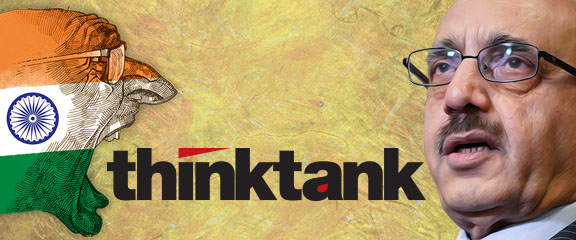India’s illegal and brazen annexation of the disputed Indian Occupied Jammu and Kashmir (IOJK) on August 5, 2019 and the international community’s strong censure of Indian actions taken in contravention of international law and the UN Security Council resolutions on Jammu and Kashmir, provided the people of Pakistan and Azad Kashmir an opportunity to reimagine, redesign and reset the Kashmir policy.
Prior to August 5, Pakistan’s Kashmir policy comprised mainly five components: attempts to engage India through bilateral talks, which India has doggedly sabotaged since 2008 under one pretext or the other; raising the Kashmir issue before the UN General Assembly and its committees; using the platform of the Organisation of Islamic Cooperation (OIC) to condemn Indian atrocities in IOJK and demanding the right of self-determination for its people; marking special days in the calendar year in Pakistan, AJK and abroad, to highlight human rights violations in IOJK and express solidarity with the Kashmiris; and finally, mobilising international civil society, especially the diaspora community, in support of the Kashmir cause.
However, hopes pinned on that policy came crashing down when India took away the limited ‘statehood’ of the occupied territory by rifling its separate flag and constitution, as well as stealing the rights and privileges of the Kashmiri population. In 1948, India itself had internationalised the Kashmir issue by taking it to the UN Security Council. But since 1972, after the signing of the Shimla Agreement, it has been harping on the bilateral nature of the dispute in order to prevent Kashmiris and the United Nations from making any diplomatic moves on Kashmir. Empirical evidence shows that India has never been sincere about initiating any meaningful bilateral process on Kashmir. Its tacit demand from Pakistan since 1971 has been that it should forget about Kashmir altogether and accept the status quo. India’s facade of bilateralism was completely exposed last year, when it blatantly and unilaterally took a raft of illegal actions in the occupied territory, calling them an internal matter. The real intent of India all along has been to keep Pakistan and Kashmiris off-balance and buy time to consolidate its occupation of Jammu and Kashmir.
Since 1947, India has used every page from its playbook of tyranny to make Occupied Kashmir part of its federation. It carried out massacres, blindings, enforced disappearances, arbitrary arrests, torture, and used rape and sexual violence as an instrument of war. Nothing worked for them. Simultaneously, they also made crude attempts to win the hearts and minds of the Kashmiris by giving development funds and bribes to select groups. This did not work either; people still demanded freedom. Successive Indian regimes also created an illicit pro-India political class in IOJK, led by Sheikh Abdullah, which would deliver Kashmiris to them. In return for privileges, these collaborators tried to sell Kashmiris to Delhi. But they did not represent the Kashmiris − and they do not, up to this day. India also tried to paint the Kashmiris’ quest for freedom as treason and terrorism, and demonised Pakistan all over the world for backing the Kashmir freedom struggle. For 72 years, successive Indian governments and occupation forces exhausted all the tricks in their political and military repertoire to subjugate Kashmiris, but nothing worked.
The rise of the Hindu nationalist-fascist doctrine of Hindutva, under the leadership of the Bharatiya Janata Party (BJP) and the Rashtriya Swayamsevak Sangh (RSS), marked a watershed in India’s Kashmir policy. These extremist forces advocated and practiced direct action, instead of pursuing Chanakayan duplicity and dissimulation of the previous regimes. They would resort to settler-colonialism, take hold of the land, change the complexion of its population and plunder the state’s resources. They laid out an elaborate plan to impoverish the population by stealing their livelihoods and businesses. As a result of these fast-track actions, the population of the occupied territory faces disenfranchisement, dispossession and displacement. In fact, according to the US-based NGO, Genocide Watch, the occupiers are preparing for the extermination of the Kashmiris. The penultimate stage is the massacre of Kashmiris, reminiscent of the Nazi Party’s mass killings and deportation of Jews in the last century. Never to be forgotten are the Jammu massacres of November 1947: nearly 250,000 Muslims were killed by violent Hindu extremists in just one month and some half-a-million were pushed out of the state. Kashmir is bracing itself for yet another holocaust.
Has the international community come to the rescue of the Kashmiris?
It has, and it hasn’t, depending on the definition of the international community. The most influential parliamentary committees and the caucuses of the US Congress, the British Parliament, and even the French National Assembly and ASEAN spoke up. The Western media not only called out the BJP regime but, in certain instances, heaped scorn on it for its crimes. A few countries also spoke up, notably China, Turkey, Malaysia and Iran. Some Western governments expressed similar concerns. One also heard carefully crafted and guarded statements from the UN leadership. There is a stark contrast between the groundswell of support for the Kashmiris in parliamentary and non-governmental circles and the silence of those governments that claim to champion human rights.
However, Kashmiris and Pakistan have scored some successes. After a gap of almost 50 years, Pakistan, with the help of China, succeeded in persuading the UN Security Council to hold three informal sessions on Kashmir. Early this year, 626 of out of 751 members of the European Parliament representing the entire EU political spectrum tabled half-a-dozen resolutions on Kashmir and India’s unlawful Citizenship Act, though the vote on these resolutions was postponed. The entire Pakistani nation and the diaspora community have successfully galvanised support for the Kashmir movement across the world.
As a consequence of India’s audacious moves, the Kashmir issue has been internationalised and moved up on the global agenda, though key decision-makers are still disinclined to intervene, stop India’s aggression in Kashmir, and push the UN to play its rightful role of priming diplomatic machinery for solutions. The Sino-Indian stand-off in Ladakh has further complicated the situation with regard to Kashmir; the border clashes in the area and beyond are likely to prove to be a long haul. This and other developments may entail reinforcement of the status quo, which would give sufficient time to the BJP-RSS combine to accomplish its nefarious agenda in Kashmir.
Short of using nuclear weapons, India is moving full steam ahead. It is involved in multidimensional warfare in Occupied Jammu and Kashmir. Firstly, its 900,000 occupation forces are fighting a full-fledged war against unarmed Kashmiris, who reject India’s writ. Secondly, worldwide, India is falsely projecting Kashmiris as terrorists. Thirdly, the BJP-RSS regime and their hardline affiliates have unleashed an all-out attack on Pakistan on the diplomatic and political fronts throughout the world. Fourth, the BJP-RSS regime has sponsored a lethal hybrid war against Pakistan with the intent of pulverising Pakistan from within by employing tactics such as proxy wars, subversion, terrorism, incitement to hatred, economic meltdown, and weakening of national institutions. Cleverly, it has also put chokeholds on Pakistan at the Financial Action Task Force (FATF), the UN Security Council and multilateral development banks to weaken Pakistan’s economy. More evidently, it has started a vicious campaign against the China-Pakistan Economic Corridor with the help of the Quadrilateral Security Dialogue (commonly known as Quad, comprising the US, Japan, Australia and India). There are indications that the Quad may be transformed into a military bloc, like NATO, in the Asia-Pacific region. The purpose of these moves is to make Kashmir a Hindu protectorate, weaken Pakistan, advance its irredentist agenda and act as a regional gendarme in South Asia and beyond.
Given the plethora of challenges, what should be Pakistan’s policy on Kashmir?
Here are some suggestions.
To begin with, you cannot succeed if you have a defeatist mindset. We must talk about the successes we have had. Unarmed Kashmiris, despite the most brutal repression in history, have continued their peaceful struggle and resistance against Indian rule. Kashmiri young men are giving their blood to secure liberty and the Kashmiri nation has declined to be subjugated. Despite a myriad threats, and the costs that Pakistan has incurred, some that imperilled its own existence, it has not changed its pristine and robust stance on Kashmir and, in the recent past, through sheer grit, it has opened new doors for Kashmir diplomacy. The diaspora community and its friends across the world are ready to take the Kashmiris’ freedom struggle against India to the next level.
Kashmir is an international issue. Let it remain in that domain. Don’t bring it back to the bilateral chambers and tables. However, it would be a Herculean task to break the impasse on Kashmir in the UN or among the most powerful nations and muster their support for a solution. A number of factors hamper their engagement, which include realpolitik, emerging fault lines in the world order which have co-opted India as the West’s favoured ally, Islamophobia, anti-China sentiment in many parts of the Western hemisphere, Pakistan’s strong association with China, and the US, India-led opposition to the Belt and Road Initiative (BRI). This does not mean that we cut off our lines of communication with the countries or forces that do not see eye-to-eye with us on Kashmir. Engagement with them is imperative. But, at the same time, we need to make new allies and remain in the international realm to build pressure to pave the way for multilateral diplomacy.
But while official diplomacy is crucial for seeking support on Kashmir, it has its own limitations. Therefore, we should now start a people’s policy or a people-centred Kashmir policy. We should approach people directly all over the world. This may sound daunting but, in practice, such a policy is feasible. My own experience as a diplomat is that if you show up at the right forums, parliamentarians, councillors, mediapersons, human rights defenders, civil society activists, university students and faculty, think tanks and grassroots organisations will pay heed and respond to your narrative. It is critical that the Kashmir movement morph into an international civil society movement. The formal decision-making institutions will drag their feet but citizens on the streets would help. We have some good models to follow, which turned the ‘impossible’ into the ‘possible’. Strong social movements have changed the world. For instance, a woman’s right to vote, civil rights in the US, the abolition of apartheid in South Africa, the end of the Vietnam War, environmental protection, have all been made possible because of global citizenry’s campaigns and resistance. Governments left to fend for themselves without the watch of the citizens, would tend to strike Faustian bargains and be blinded by crass mercantilism. The same formula applies to Kashmir. There is no dearth of evidence about the BJP-RSS regime’s crimes against humanity in IOJK but the perpetrators are not being tried in tribunals. On the contrary, they are being appeased and mollycoddled. So kick up a furore about this global acquiescence to Indian crimes and trampling of Kashmiris’ rights through an international, peaceful resistance movement.
Lawfare is another path. Contrary to public opinion that this tool has not been used in the past to attain the right of self-determination for the people of Jammu and Kashmir, the lengthy debates in the Security Council in the late 1940s and 1950s and more than a dozen resolutions on Kashmir passed in the Council were all a product of lawfare. Of course, lawfare today encompasses such areas as genocide, crimes against humanity, ethnic cleansing, war crimes, targeted killings, cybersecurity and much more. We know for certain that India is accountable for its crimes in the occupied territory. The applicable law is clear too; it includes the Fourth Geneva Convention, Additional Protocol I, the 1948 Genocide Convention, the Statute of the International Criminal Court, several Security Council resolutions and many conventions and treaties under international humanitarian law. The Genocide Convention, in particular, enunciates that any action with the special intent, dolus speciales, to destroy, in whole or in part, a national, ethnic, racial or religious group constitutes genocide. This is precisely what is happening in IOJK. The International Court of Justice (ICJ) considers the prohibition of genocide as a peremptory norm of international law, or jus cogens; so should its prevention, in my view. We could also seek the advice of the International Law Commission on the establishment of a special tribunal to conduct trials on the crimes against humanity being committed in IOJK.
A Boycott, Divestment and Sanctions (BDS) movement should be launched against India because global corporate leaders, through their transactions and Foreign Direct Investment in India (FDI), underwrite Indian genocidaires’ crimes in IOJK. The richer India gets, the more ruthless it becomes in weaponising its fascism and lebensraum in the occupied territory. An incipient BDS movement has started in the form of thousands of media commentaries and extensive visual content on Kashmir, but it needs to be formalised.
Kashmir’s freedom ought to be directly linked with Pakistan’s national security. It is not mere sloganeering to say that Pakistan is incomplete without Jammu and Kashmir; it is a stark fact. Whether we think of Pakistan’s territorial integrity, or its water security, or economic resilience, Kashmir lies at the centre. Given the threats from the BJP-RSS regime to take Azad Jammu and Kashmir and Gilgit-Baltistan, and disintegrate Pakistan to realise their dream of Akhand Bharat, we have to conceive a Greater Pakistan Vision to save Kashmir, and Pakistan itself.
To stem India’s expansionist agenda, we have to secure our borders and boundaries that have become vulnerable to Indian misadventures and incursions. AJK and G-B need special protection. So do other areas of Pakistan that are being threatened by Indian-sponsored implosive asymmetric wars, whether in the kinetic or non-kinetic realms.
In order to protect the country’s vital interests and embark on the ambitious path of state building that includes Kashmir, the economy should be put centrestage. Economic and human development is of strategic importance. If this aspect is not handled well, all plans would prove to be mere sand castles.
The communications bonanza that we had on Kashmir at the international level last year, following India’s occupation and annexation of the territory, is ephemeral and transient. It opened many doors for us, but this new space will disappear if we do not take the lead and demonstrate leadership. Despite numerous distractions, the world is still attentive to Kashmir. Now is the time to make the most of this opportunity, or else it would simply vaporise.
Finally, we need a bigger tool box to deal with India’s hegemonism and expansion. Full-spectrum aggression demands a full-spectrum response. The balance of power should not remain skewed. We must scale up for establishing a tangible equilibrium and the entire nation must be galvanised for this endeavour.




